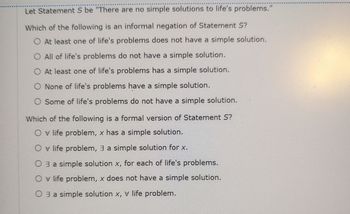
Advanced Engineering Mathematics
10th Edition
ISBN: 9780470458365
Author: Erwin Kreyszig
Publisher: Wiley, John & Sons, Incorporated
expand_more
expand_more
format_list_bulleted
Question
thumb_up100%

Transcribed Image Text:Let Statement S be "There are no simple solutions to life's problems."
Which of the following is an informal negation of Statement S?
At least one of life's problems does not have a simple solution.
O All of life's problems do not have a simple solution.
O At least one of life's problems has a simple solution.
O None of life's problems have a simple solution.
O Some of life's problems do not have a simple solution.
Which of the following is a formal version of Statement S?
O v life problem, x has a simple solution.
O v life problem, 3 a simple solution for x.
3 a simple solution x, for each of life's problems.
O v life problem, x does not have a simple solution.
O3 a simple solution x, V life problem.
*****
Expert Solution
This question has been solved!
Explore an expertly crafted, step-by-step solution for a thorough understanding of key concepts.
This is a popular solution
Trending nowThis is a popular solution!
Step by stepSolved in 2 steps with 2 images

Knowledge Booster
Similar questions
- 6. Fill in the blank with "all", "no", or “some" to make the following statements true. Note that "some" means one or more instances, but not all. • If your answer is "all", then give a brief explanation as to why. If your answer is "no", then give an example and a brief explanation as to why. • If your answer is "some", then give two specific examples that illustrate why your answer it not "all" or "no". Be sure to explain your two examples. An example must include either a graph or a specific function. (a) For (a, b). functions f, if f"(x) > 0 on the interval (a, b), then f'(x) < 0 on the interval (b) For functions f, if f(x) is a polynomial, then it is differentiable for all x. (c) For f(x) at exactly one point. functions f, the tangent line to f(x) at x = a will intersect the graph of In mathematics, we consider a statement to be false if we can find any examples where the statement is not true. We refer to these examples as counterexamples. Note that a counterexample is an example…arrow_forwardIdentify the argument as converse fallacy or inverse fallacy All Employees Regularly Late will be Fired. Sharon was fired. ⇒ Sharon was regularly late.arrow_forwardWhich of these statements is logically equivalent to "You don't Love Hamburger or you are not American if you don't love Donuts"? Select one: O a. If you love Donuts then you are American and love Hamburger O b. You don't love Donuts, or you are American and love Hamburger O c. Both Answersarrow_forward
- Linguistics/Semantics Discrete Math question!arrow_forwardAlice and Belle are perfect logicians. Each of them is given a different fraction, of the form , where n is a positive integer. They only know their own number and they know it's a different fraction from the other. They need to tell whose number is larger. The following conversation occurs: Alice: "I don't know". Belle: "I don't know either." Alice: "I still don't know." Belle: “Now I know whose number is larger." Alice: "Now I know your number too." Who has the larger number? What is the difference of the denominators? (A) Alice. 1. (B) Alice. 2. (C) Belle. 1. (D) Belle. 2.arrow_forward
arrow_back_ios
arrow_forward_ios
Recommended textbooks for you
 Advanced Engineering MathematicsAdvanced MathISBN:9780470458365Author:Erwin KreyszigPublisher:Wiley, John & Sons, Incorporated
Advanced Engineering MathematicsAdvanced MathISBN:9780470458365Author:Erwin KreyszigPublisher:Wiley, John & Sons, Incorporated Numerical Methods for EngineersAdvanced MathISBN:9780073397924Author:Steven C. Chapra Dr., Raymond P. CanalePublisher:McGraw-Hill Education
Numerical Methods for EngineersAdvanced MathISBN:9780073397924Author:Steven C. Chapra Dr., Raymond P. CanalePublisher:McGraw-Hill Education Introductory Mathematics for Engineering Applicat...Advanced MathISBN:9781118141809Author:Nathan KlingbeilPublisher:WILEY
Introductory Mathematics for Engineering Applicat...Advanced MathISBN:9781118141809Author:Nathan KlingbeilPublisher:WILEY Mathematics For Machine TechnologyAdvanced MathISBN:9781337798310Author:Peterson, John.Publisher:Cengage Learning,
Mathematics For Machine TechnologyAdvanced MathISBN:9781337798310Author:Peterson, John.Publisher:Cengage Learning,


Advanced Engineering Mathematics
Advanced Math
ISBN:9780470458365
Author:Erwin Kreyszig
Publisher:Wiley, John & Sons, Incorporated

Numerical Methods for Engineers
Advanced Math
ISBN:9780073397924
Author:Steven C. Chapra Dr., Raymond P. Canale
Publisher:McGraw-Hill Education

Introductory Mathematics for Engineering Applicat...
Advanced Math
ISBN:9781118141809
Author:Nathan Klingbeil
Publisher:WILEY

Mathematics For Machine Technology
Advanced Math
ISBN:9781337798310
Author:Peterson, John.
Publisher:Cengage Learning,

